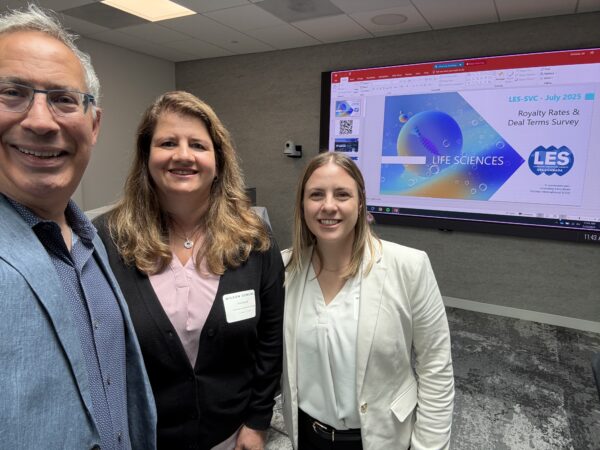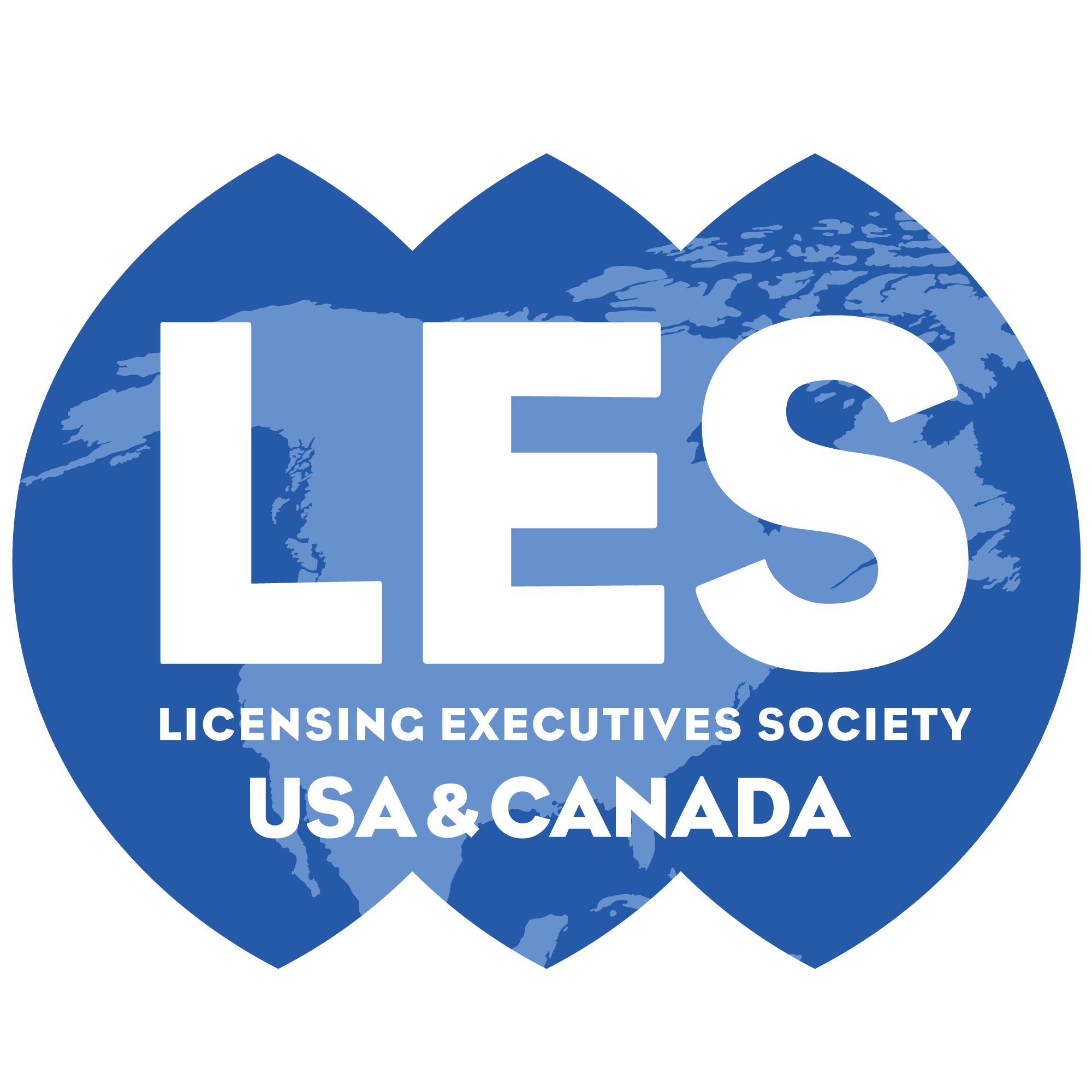Navigating the Evolving Landscape of Life Sciences Licensing -Insights from the LES Silicon Valley Chapter’s First in a 3-Part life Sciences Series
By: Efrat Kasznik, LES USA-Canada Board Member & LES SV Chapter Chair
The July 23 panel hosted by Wilson Sonsini and the LES Silicon Valley Chapter, brought together seasoned dealmakers and biotech experts to examine current trends in licensing, investment, and M&A. The meeting included highlights from the LES Life Sciences Royalty Rate Survey, a keynote address by Ian Edvalson of Wilson Sonsini, and a moderated panel of experts dealing with trends, challenges and opportunities in Life Sciences licensing.
Preview of the 2025 LES Life Sciences Royalty Rate and Deal Terms Survey

LES-SVC Board members, Left to Right – Michael Pierantozzi (Program Committee Chair), Efrat Kasznik (Chapter Chair), Natalie Punnilathil (event moderator)
Natalie J. Punnilathil, Ph.D., Director of Business Development & Licensing at Parker Institute for Cancer Immunotherapy, and a board member of LES Silicon Valley chapter, provided a brief preview of the 2025 LES Life Sciences Royalty Rates and Deal Terms Survey, which offers exclusive benchmarking data and trends across upfront payments, royalties, milestones, and more. The study revealed that upfront payments remain modest and deals are increasingly back-end loaded, particularly for sales milestones. Both development and sales milestones were highest for products that had achieved proof of concept. The study is available for free download to all LES members.
Relationships as Strategic Assets: Keynote Address by Wilson Sonsini’s Ian Edvalson

Keynote Speaker, Ian Edvalson, Partner, Technology Transactions, Wilson Sonsini Goodrich & Rosati
Ian Edvalson, a technology transactions partner at Wilson Sonsini, delivered a compelling presentation titled “Relationships as Strategic Assets.” Drawing on nearly three decades of experience advising biotech and pharma companies, Edvalson emphasized that trust and collaboration are just as critical as contracts when it comes to long-term deal success. He unpacked common stress points in biotech-pharma partnerships—such as misaligned goals, governance stagnation, and leadership turnover—and outlined practical strategies to manage them. These included aligning early on long-term objectives, building streamlined governance structures, planning for disputes and transitions, and conducting regular relationship “health checks.” Edvalson’s key message was that successful collaborations don’t just happen—they require intention, structure, and continuous care. As he succinctly put it, “We write contracts for clarity—but we manage relationships for resilience.”
Panel Discussion Highlights
The panel was moderated by Natalie J. Punnilathil, Ph.D. Panelists included Cristina Ghenoiu, Ph.D. (Partner, Mubadala Capital), Timothy Herpin, Ph.D. (Fractional CBO to multiple biotech startups), Todd Pazdera, Ph.D. (Director of Business Development, UCSF Innovation Ventures), and David Pirko (Partner, Technology Transactions, Wilson Sonsini Goodrich & Rosati).
A Cautiously Optimistic Deal Environment
Despite lingering headwinds, panelists agreed that the market is slowly recovering from the downturn of the past two years. Deal volumes are steady, but terms remain conservative, especially for platform companies. Buyers are more selective and cautious, focusing on later-stage, de-risked assets. As one panelist put it, “Deals are getting done, but the prices and timelines aren’t what they used to be.”
M&A activity is concentrated around commercial-stage assets. Recent examples like Merck’s $10B+ acquisition of Verona show that even large deals come with lower-than-usual premiums. Meanwhile, venture capital is flowing into hot areas like obesity—but there’s widespread hesitation to bet on a winner, leading to cautious, “safe” deals across the board.

Event panel – Left to Right –Cristina Ghenoiu, Ph.D. (Partner, Mubadala Capital), Todd Pazdera, Ph.D. (Director of Business Development, UCSF Innovation Ventures), Timothy Herpin, Ph.D. (Fractional CBO to multiple biotech startups), David Pirko (Partner, Technology Transactions, Wilson Sonsini Goodrich & Rosati), Natalie J. Punnilathil, Ph.D. (Parker Institute)
Platform Tension and the “Asset-First” Mentality
A recurring theme was the tension between developing broad technology platforms and the investor preference for single-asset plays. Investors are increasingly asset-centric, pressuring startups to advance lead candidates and minimize spending on platform R&D.
As UCSF Innovation Ventures highlighted, startups often license with the intent to maximize platform potential—but deals with pharma tend to isolate individual assets while restricting broader use of the underlying platform. This can undermine long-term value creation, particularly when legal terms prevent use in adjacent therapeutic areas.
The Role of AI: Tool or Product?
AI is a critical capability, especially in drug discovery, digital health, and trial design. However, panelists noted that biotech VCs often expect AI capabilities as a given but don’t necessarily understand or value them as a standalone innovation. Cristina Ghenoiu observed that few funds have the expertise to assess AI integration critically, even though they expect startups to use it.
Innovators are experimenting with hub-and-spoke models to build around platforms, but the market continues to pull attention toward lead assets over time—limiting diversification.
Global Dynamics and Regulatory Trends
US companies are increasingly licensing high-quality, innovative assets from China to leverage significantly lower R&D costs, a competitive trend that persists despite growing geopolitical scrutiny and potential policy changes that could hinder future deals. Panelists discussed growing caution around China-related deals. Export control policies and shifting perceptions of Chinese assets have made universities more hesitant to engage. Though China offers lower-cost clinical trial options, geopolitical risks have created barriers, particularly around tech transfer and investor relations.
On the regulatory front, the FDA’s push for accelerated approvals in rare diseases has caught the attention of some investors. These pathways may become increasingly attractive to startups looking for a faster route to commercialization.
Looking Ahead: Resilient and Purposeful
The panel wrapped with a “Lightning Round” one-word forecast for 2025 dealmaking. Responses included: resilient, persistent, partnership, purposeful, and prioritize—terms that reflect a biotech ecosystem learning to adapt rather than retreat. The message for biotech innovators, investors, and dealmakers: focus, alignment, and partnership will define the next phase of success. In a capital-constrained and risk-sensitive environment, those who can prioritize high-value opportunities and build strategic relationships will be best positioned for what comes next.

Get Social